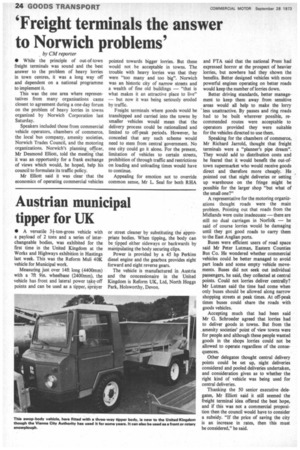'Freight terminals the answer to Norwich problems'
Page 26

If you've noticed an error in this article please click here to report it so we can fix it.
by CM reporter
• While the principle of out-of-town freight terminals was sound and the best answer to the problem of heavy lorries in town centres, it was a long way off and dependent on a national programme to implement it.
This was the one area where representatives from many organisations came closest to agreement during a one-day forum on the problem of heavy lorries in towns organized by Norwich Corporation last Saturday.
Speakers included those from commercial vehicle operators, chambers of commerce, the local bus company, amenity societies. Norwich Trades Council, and the motoring organizations. Norwich's planning. offi_ cer, Mr Desmond Elliott, told the meeting that it was an opportunity for a frank exchange of views which would, he hoped, help his council to formulate its traffic policy.
Mr Elliott said it was clear that the economics of operating commercial vehicles pointed towards bigger lorries. But these would not he acceptable in towns. The trouble with heavy lorries was that they were "too many and too big". Norwich was an historic city of narrow streets and a wealth of fine old buildings — "that is what makes it an attractive place to live" — but now it was being seriously eroded by traffic.
Freight terminals where goods would be transhipped and carried into the towns by smaller vehicles would mean that the delivery process could be rationalized and limited to off-peak periods. However, he conceded that any such scheme would need to stem from central government. No one city could go it alone. For the present, limitation of vehicles to certain streets, prohibition of through traffic and restrictions on loading and unloading times would have to continue.
Appealing for emotion not to override common sense, Mr L. Seal for both RHA and FTA said that the national Press had expressed horror at the prospect of heavier lorries, but nowhere had they shown the benefits. Better designed vehicles with more powerful engines operating on better roads would keep the number of lorries down.
Better driving standards, better management to keep them away from sensitive areas would all help to make the lorry less unattractive. By passes and ring roads had to be built wherever possible, recommended routes were acceptable to operators provided they were suitable for the vehicles directed to use them.
Speaking for the chambers of commerce, Mr Richard Jarrold, thought that freight terminals were a "planner's pipe dream". They would add to distribution costs and he feared that it would benefit the out-oftown supermarket who would receive goods direct and therefore more cheaply. He pointed out that night deliveries or setting up warehouse on the fringe might be possible for the larger shop "but what of the small one?"
A representative for the motoring organizations thought roads were the main problem. Pointing out that roads from the Midlands were ouite inaderouate — there are still no dual carriages in Norfolk — he said of course lorries would be damaging until they got good roads to carry them to the East Anglian ports.
Buses were efficient users of road space said Mr Peter Lutman, Eastern Counties Bus Co. He wondered whether commercial vehicles could be better managed to avoid part loads and some empty vehicle movements. Buses did not seek out individual passengers, he said, they collected at central points. Could not lorries deliver centrally? Mr Lutman said the time had come when only buses should be allowed along narrow shopping streets at peak times. At off-peak times buses could share the roads with goods vehicles.
Accepting much that had been said Mr G. Schroeder agreed that lorries had to deliver goods in towns. But from the amenity societies' point of view towns were for people and although these people wanted goods in the shops lorries could not be allowed to operate regardless of the consequences.
Other delegates thought central delivery points could be set up, night deliveries considered and pooled deliveries undertaken, and consideration given as to whether the right kind of vehicle was being used for central deliveries.
Thanking the 50 senior executive delegates, Mr Elliott said it still seemed the freight terminal idea offered the best hope, and if this was not a commercial proposition then the council would have to consider a subsidy. "If the price of saving the city is an increase in rates, then this must be considered," he said.












































































































